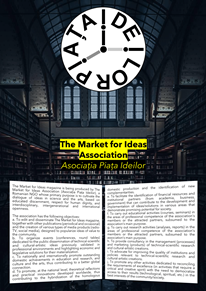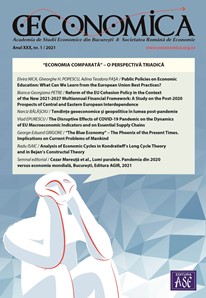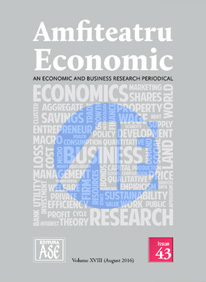
Some Thoughts on COVID-19 Pandemic Shock Economy Near Us (XXIX)
On the nature of COVID-19 pandemic shock
We think the COVID-19 pandemic shock “verifies” the following features:
- the shock is atypical: it has the particularity that it bypasses the standard “path” – that is, it does not affect the nominal flows of the economy (especially the financing or re-financing mechanisms) – but directly affects the real economy:
- the reduction/limitation of economic activities involving human agglomerations (in order to avoid the spread of the SARS-CoV-2 virus) has led to a decrease in the labour factor in the production function, thus to a decrease in domestic supply;
- the reduction of labour force participation in economic activity also led to a reduction in aggregate demand – especially at the level of private consumption of goods and services – which additionally and negatively affected domestic supply, by a circular causality;
- negative expectations regarding the short-term evolution of the economic situation created have led to a decrease in the propensity to invest, although it is possible that the propensity to save has increased (although the reduction in disposable income should lead, “theoretically", to a reduction of the marginal propensity to save);
- the shock is external: this feature is very important. Indeed, an internal shock is a shock that is “secreted" by that economic mechanism (inside a decentralized economic system – a free market – an internal shock is a necessary function of that system), which means that it is a result inherent in the respective decentralized economic structure. So being, in fact, an external shock, it is not structural to the Romanian economic system, so its potential to trigger a crisis is relatively small (of course, if the institutional emergency decisions do not help such a triggering);
- the shock is non-economic: in general, a shock that affects an economic system can be:
- economic/real (meaning the sudden and unpredictable fluctuation of a variable of the real economy – example: a massive emigration of the active labour force, which suddenly and massively reduces the internal employment);
- economic/nominal/financial (meaning the sudden and unpredictable fluctuation of a variable of the nominal economy – example: a massive increase of the money supply, which generates a strong inflation of pull type);
- natural (meaning a sudden and unpredictable fluctuation of a natural variable – example: an earthquake, a flood, an epidemic);
- institutional/political (meaning a sudden and unpredictable fluctuation of the normative framework, of the political regime or of the form of government – example: the social and political events of 1989).
The essential consequences of these particularities of the external pandemic shock, for the Romanian economy, are the following:
- the shock does not affect economic structures, but only their functioning, in terms of dimensional reduction, rhythm, speed, etc. in terms of production and consumption (transactions);
- direct consequence: the functional impairment is not persistent, but reversible;
- the shock has the potential to create negative (pessimistic) short-term (and even medium-term) expectations;
- direct consequence: in a free, decentralized market economy, such as the Romanian economy, economic actors make economic decisions based on expectations (even rational expectations derived from rationality models – qualitative and/or quantitative – are affected by these expectations, or of these feelings about the future); if expectations are negative (pessimistic), economic decisions will generate a reduction in the activism of economic actors, with an impact on the generation of recession or, worse, depression;
- the shock does not (yet) affect the financing/refinancing mechanisms of the real economy;
- direct consequence: there is no significant disturbance of either the banking system or the capital market, from the perspective of the financing/refinancing capacity (indirect, respectively direct) of the real economy.
The conditions which could initiate a crisis of the real economy
Generally, an economic crisis is a structural (not just functional) disruption of an economic system, for example, a national economic system. Being structural in nature, the economic crisis will also change the functioning of the economy, i.e. it will change the performance of its functions of production, distribution, consumption and redistribution, by affecting the main macroeconomic variables: aggregate demand, aggregate supply, prices, profits, investment, employment and lastly, the standard of living and the quality of life.
The external shock was non-economic, unpredictable, but with predictable effects, although it did not act in the “standard" mode, i.e. by disrupting the nominal component of the economy. It has the potential to initiate an economic crisis, first in the real economy and then in the nominal one, should the following conditions be met. These conditions should be avoided at all costs, even with a high budgetary sacrifice:
- Delays in providing support (not only financially, but especially from an employment perspective) to the real economy:
- Large companies (if necessary), which have a horizontal driving effect on the real economy;
- SMEs that are not mostly dependent on subcontracting by large companies;
- The primary economic sector – especially agriculture – and the secondary sector – especially construction (in this order of logical and chronological importance);
NB1: it does not matter if the support provided is only partial, its granting also has an important psychological effect.
NB2: In our opinion, given the direct impact on the real economy (domestic supply), a delay of more than two months in taking measures to resume economic activity may be the threshold beyond which the risk of an economic crisis becomes all but certain.
- allowing the formation of negative (pessimistic) expectations regarding prices (including wages) and profits:
- this condition is probably the essential condition in preparing for the initiation of a crisis in the real economy (which then follows a cascade phenomenon), and it must be firmly avoided;
- allowing the banking system to become excessively autonomous from the problems of the real economy, and to secure its sectoral interest asymmetrically with the real economy:
- in a free and decentralized market economy, such as the Romanian economy, commercial banks will tend to protect their own interests when they are no longer served by the dynamics of the real economy;
- this behaviour does not violate the principles of a functioning market economy, but it must be limited by government intervention, namely by economic means (credit subsidies, government credit guarantees and the like), which increase the opportunity cost of the banking system for the case in which it does not specifically participate in the resumption of activities in the real economy.
NB: the health, certainty and continuity of the financing/refinancing of the economy, especially of the real economy, is the key, both for avoiding the entry into the economic crisis and for the exit from the crisis.








